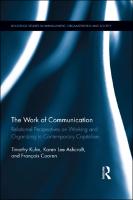The Work of Communication
Proposal review
Relational Perspectives on Working and Organizing in Contemporary Capitalism
| dc.contributor.author | Kuhn, Timothy | |
| dc.contributor.author | Ashcraft, Karen Lee | |
| dc.contributor.author | Cooren, François | |
| dc.date.accessioned | 2022-02-10T12:47:58Z | |
| dc.date.available | 2022-02-10T12:47:58Z | |
| dc.date.issued | 2017 | |
| dc.identifier | ONIX_20220210_9781317397984_13 | |
| dc.identifier | OCN: 993757430 | |
| dc.identifier.uri | https://library.oapen.org/handle/20.500.12657/52758 | |
| dc.description.abstract | The Work of Communication: Relational Perspectives on Working and Organizing in Contemporary Capitalism revolves around a two-part question: "What have work and organization become under contemporary capitalism—and how should organization studies approach them?" Changes in the texture of capitalism, heralded by social and organizational theorists alike, increasingly focus attention on communication as both vital to the conduct of work and as imperative to organizational performance. Yet most accounts of communication in organization studies fail to understand an alternate sense of the "work of communication" in the constitution of organizations, work practices, and economies. This book responds to that lack by portraying communicative practices—as opposed to individuals, interests, technologies, structures, organizations, or institutions—as the focal units of analysis in studies of the social and organizational problems occasioned by contemporary capitalism. Rather than suggesting that there exists a canonically "correct" route communicative analyses must follow, The Work of Communication: Relational Perspectives on Working and Organizing in Contemporary Capitalism explores the value of transcending longstanding divides between symbolic and material factors in studies of working and organizing. The recognition of dramatic shifts in technological, economic, and political forces, along with deep interconnections among the myriad of factors shaping working and organizing, sows doubts about whether organization studies is up to the vital task of addressing the social problems capitalism now creates. Kuhn, Ashcraft, and Cooren argue that novel insights into those social problems are possible if we tell different stories about working and organizing. To aid authors of those stories, they develop a set of conceptual resources that they capture under the mantle of communicative relationality. These resources allow analysts to profit from burgeoning interest in notions such as sociomateriality, posthumanism, performativity, and affect. It goes on to illustrate the benefits that investigations of work and organization can realize from communicative relationality by presenting case studies that analyze (a) the becoming of an idea, from its inception to solidification, (b) the emergence of what is taken to be the "the product" in high-tech startup entrepreneurship, and (c) the branding of work (in this case, academic writing and commercial aviation) through affective economies. Taken together, the book portrays "the work of communication" as simultaneously about how work in the "new economy" revolves around communicative practice and about how communication serves as a mode of explanation with the potential to cultivate novel stories about working and organizing. Aimed at academics, researchers, and policy makers, this book’s goal is to make tangible the contributions of communication for thinking about contemporary social and organizational problems. | |
| dc.language | English | |
| dc.relation.ispartofseries | Routledge Studies in Management, Organizations and Society | |
| dc.subject.classification | thema EDItEUR::K Economics, Finance, Business and Management::KJ Business and Management::KJP Business communication and presentation | en_US |
| dc.subject.classification | thema EDItEUR::K Economics, Finance, Business and Management::KJ Business and Management::KJU Organizational theory and behaviour | en_US |
| dc.subject.other | Communication as Constitutive of Organization | |
| dc.subject.other | Communication Studies | |
| dc.subject.other | Knowledge and knowledge management | |
| dc.subject.other | organization studies | |
| dc.title | The Work of Communication | |
| dc.title.alternative | Relational Perspectives on Working and Organizing in Contemporary Capitalism | |
| dc.type | book | |
| oapen.identifier.doi | 10.4324/9781315680705 | |
| oapen.relation.isPublishedBy | 7b3c7b10-5b1e-40b3-860e-c6dd5197f0bb | |
| oapen.relation.isFundedBy | Knowledge Unlatched | |
| oapen.relation.isbn | 9781317397984 | |
| oapen.relation.isbn | 9781138930155 | |
| oapen.relation.isbn | 9781315680705 | |
| oapen.relation.isbn | 9780367243067 | |
| oapen.collection | Knowledge Unlatched (KU) | |
| oapen.imprint | Routledge | |
| oapen.pages | 232 | |
| oapen.grant.number | 7196 | |
| peerreview.anonymity | Single-anonymised | |
| peerreview.id | bc80075c-96cc-4740-a9f3-a234bc2598f1 | |
| peerreview.open.review | No | |
| peerreview.publish.responsibility | Publisher | |
| peerreview.review.stage | Pre-publication | |
| peerreview.review.type | Proposal | |
| peerreview.reviewer.type | Internal editor | |
| peerreview.reviewer.type | External peer reviewer | |
| peerreview.title | Proposal review | |
| oapen.review.comments | Taylor & Francis open access titles are reviewed as a minimum at proposal stage by at least two external peer reviewers and an internal editor (additional reviews may be sought and additional content reviewed as required). |

